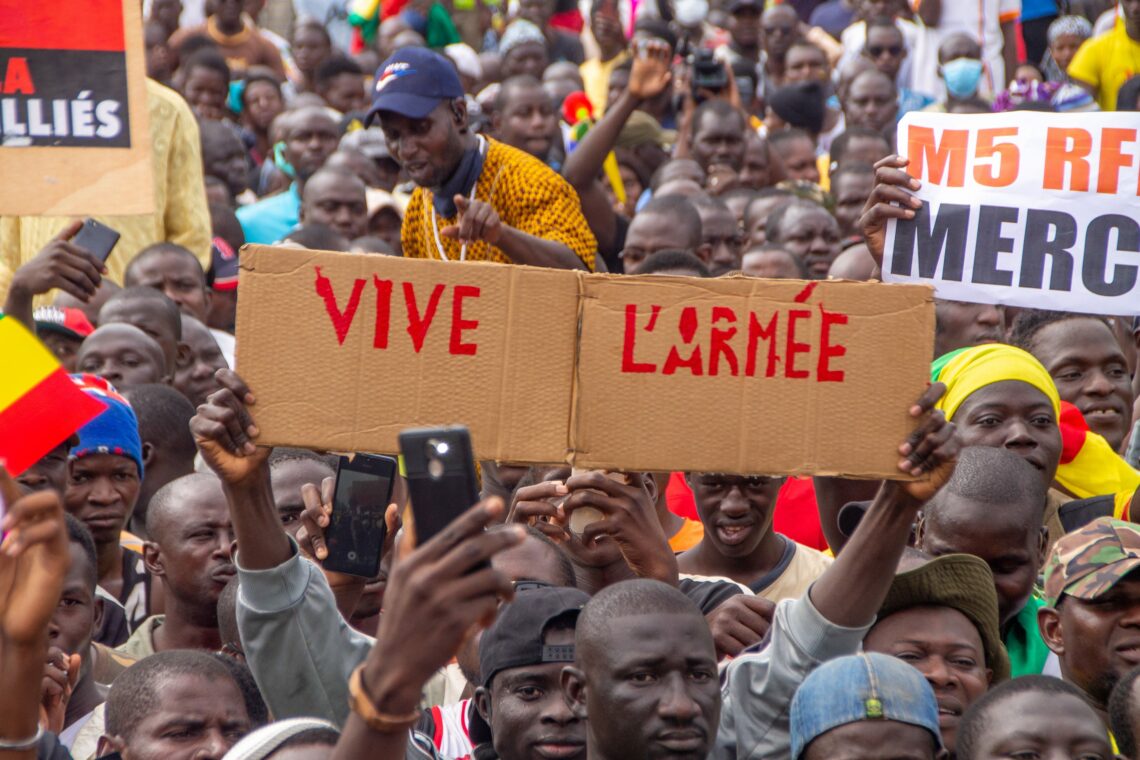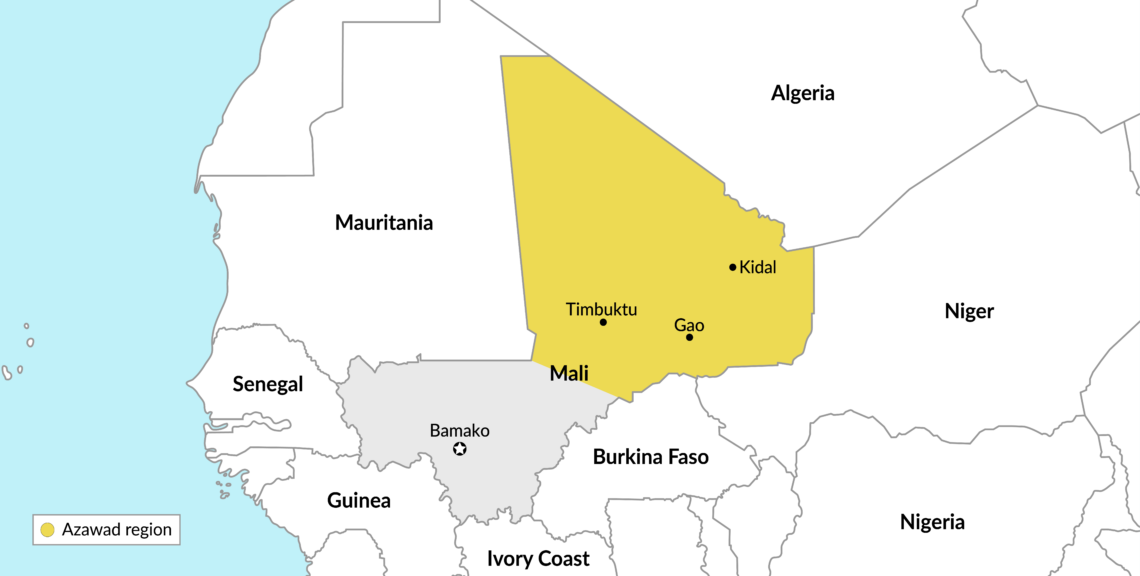Coup in Mali spells risk, instability and violence
The coup in Mali has brought down Ibrahim Boubacar Keita. The tumultuous transition period has ended with the appointment of a new president and government. But violence and a refugee crisis have worsened due in part to jihadist groups.

In a nutshell
- The coup in Mali has given way to uncertainty
- A multifaceted conflict is spreading
- Outside powers will deal with the blowback
Recent events in Mali follow a familiar pattern of leadership change in Africa, as observed in cases like Zimbabwe, Algeria, or Sudan: long-standing leaders forced to step down due to a combination of strong popular protests and military pressure.
These processes combined elements of popular revolutions with military coups, and their medium- to long-term consequences remain uncertain. While protests may legitimize leadership change, the military often retains significant, if not decisive, power. Furthermore, even if an allegiance is established between civilians and the military, it tends to be dissolved once the president is removed from power.
Ibrahim Boubacar Keita, the recently deposed president of Mali, may not have been “president for life” like some of his counterparts; he was first elected in 2013 and had been reelected for a second term in March 2020. But his leadership was marked by corruption, ineffectiveness on security and the economy, and abuses of power. Even worse, as opposed to cases like Algeria or Sudan, Mali is a fragile and fragmented state.
In August, soldiers arrested Mr. Keita and other political officials, and subsequently announced the formation of a National Committee for the Salvation of the People (CNSP) led by Colonel Assimi Goita, who fought jihadists in Northern Mali. That the leadership change was determined by a mutiny openly defied the Economic Community of West African States (ECOWAS) policy of “zero tolerance” toward irregular power transfers. The regional organization reacted by suspending Mali from its decision-making bodies and imposing harsh sanctions, including the closure of the country’s land and air borders.
The African Union also suspended Mali’s membership, the United Nations Security Council demanded the immediate release of the detainees, and the EU halted its training missions in the country. But despite this quick and strong reaction, it soon became clear that regional and international actors would have to negotiate with the ruling junta.
Multiple actors
To understand the recent events and their potential consequences, it is necessary to consider the myriad actors shaping Mali’s political and security outlook. The military junta (CNSP) has emerged as the most relevant decision maker after the August coup. However, it was forced to negotiate with both the ECOWAS and the June 5 Movement, which organized the popular protests that erupted after the elections, denouncing the government’s corruption and inefficiency and calling for the president’s resignation. The movement included opposition parties, unions, religious groups, and civil society organizations.
Negotiations resulted in a reduction, at least formally, of the junta’s power throughout the 18-month transition period. One of the ECOWAS demands was that the president had to be a civilian. The CNSP appointed Bah N’daw, a retired colonel who served as defense minister under President Keita. While Colonel Assimi Goita has been appointed interim vice president, it has been formally established (following pressure from the ECOWAS and the Movement) that if the president becomes incapacitated, he shall not be replaced by the vice president.
In a sign of good will and commitment, the government also released politicians who had been arrested by the military during the coup, including the former prime minister and the national assembly speaker. Key positions, though, including the portfolios of defense, security and territorial administration, have been assigned to military officials. Furthermore, one of the ECOWAS’ demands – the dissolution of the junta – has yet to be met.
The security situation is particularly critical in the three-border area between Mali, Burkina Faso and Niger.
But the future of Mali and the Sahel region will also be determined by actors and dynamics outside Bamako. The 2012 Tuareg rebellion fragmented the country, and led to the formation of several groups fighting for power and territory in Northern Mali. Following long and complicated negotiations, the Algiers Peace Agreement was signed in 2015 by the Malian government, separatist armed groups representing Tuareg and Arab communities (under the Coordination of Azawad Movements), and armed groups fighting for territorial integrity (the pro-unity Platform of Movements). Members of the groups that signed the accords have joined the recently formed government in Bamako.
While the signatories have to a certain extent abstained from armed conflict, the peace deal has been largely ineffective. Violence in the country has expanded, and the number of refugees and internally displaced persons have dramatically increased over the past two years, reflecting the proliferation of other armed groups and the vulnerability of certain regions.
Jihadist groups operating in the country, like Jama’at Nasr al-Islam wal Muslimin (JNIM) and the Movement for Unity and Jihad in West Africa (MUJAO), have exploited the instability and power vacuums that have characterized Mali since 2012. New splinter groups like the so-called “Those Who Sign in Blood Brigade” aim to attack Western symbols and interests, spread jihad and establish a caliphate in Northern Africa.
Given the regional nature of some of these groups, the security situation is particularly critical in the three-border area between Mali, Burkina Faso and Niger. However, the outlook has also deteriorated in central Mali, where ethnic Dogon hunters have been attacking Fulani herders. Although less visible, farmer-herder violence has been a trend in Africa, particularly in semiarid regions and in fragile states where law enforcement is poor and property law inadequate.
Mali is also the theater of numerous regional and international peacekeeping and security operations. These include the United Nations Multidimensional Integrated Stabilization Mission in Mali (MINUSMA), established in 2013 and which now has 12,438 military personnel deployed; the G5-Sahel Joint Force, established in 2017, which operates in Mali, Chad, Burkina Faso, Niger and Mauritania in the areas of counterterrorism, organized cross-border crime and human trafficking; the EUTM Mali, an EU mission composed of 1,066 military personnel; and the French Operation Barkhane, established in 2014 and headquartered in N’Djamena.
Lessons learned
Recent events in Mali provide important lessons about stabilization attempts in the contexts of authoritarian rule. First, they highlight how ineffective regimes in fragile states represent a particularly serious threat to long-term stability. The leadership change was triggered – albeit not determined – by protests against electoral fraud, the government’s inability to fulfill its basic functions, and corruption, including the misappropriation of public health funds amid the Covid-19 crisis.
Facts & figures

Second, those in power are not the only ones whose legitimacy is fragile. In the case of Mali, and despite the significant number and size of military forces deployed in the country, regional and international players have failed to stabilize the northern and central regions. This failure, combined with denunciations of human rights violations and misuse of force by the national army, explains why trust in such actors has been eroding. Furthermore, events in Mali also suggest that regional and international leverage, even in fragile states, is limited.
Before President Keita was forced to step down, the U.S. special envoy to the Sahel Peter Pham warned that an extra-constitutional change of government was “out of the question.” After Mr. Keita was removed, French President Emmanuel Macron urged the junta to hand power back to civilians while the ECOWAS first reacted by announcing harsh sanctions. However, as events unfolded, it became clear that the CNSP’s leverage was significant because of the fear of escalating violence.
The operational capacity of many armed groups goes beyond Malian territory, representing an existential threat for communities in neighboring countries.
Scenarios
How will the coup affect politics and security in Mali and the Sahel?
The current situation is critical. Large portions of territory remain outside state control. They are now home to a dangerous confluence of non-state actors, including terrorist groups in a complex and volatile network of allegiances, militias, organized crime groups, humanitarian organizations and regional and international stabilization forces.
The operational capacity of many of these armed groups goes beyond Malian territory, representing an existential threat for communities in neighboring countries, already battered by violence. At the same time, the limits of current solutions – including the attempt by external military forces and humanitarian organizations to fill the void left by state failure – have become increasingly clear.
Considering internal and regional dynamics, violence in Mali and in the Sahel will likely persist, reflecting ongoing state failure and instability. Recent events will further compromise the implementation of the Algiers peace process and, though less likely, could reignite separatist aspirations. Key events in Western African and Sahel countries – including elections in Burkina Faso, Guinea, Ivory Coast and Niger – may lead to political turmoil with consequences across the region.
Moreover, as citizens in urban areas are confronted with the economic consequences of the Covid-19 pandemic and the further deterioration of living conditions, popular protests may grow. Rising communal violence is expected to lead to a substantial increase of displacement and food insecurity in rural areas, as people are forced to abandon their fields.
Under such a scenario, and considering the challenges posed by upcoming elections, the ECOWAS legitimacy and operational capacity will be affected, and other players involved in security operations in the region – including the EU, France and the U.S. – will face an increasingly challenging environment. Moreover, Mali is an important origin and destination country for migratory routes towards the Maghreb and Europe. It has also become an operational basis for regional and international jihadism. If the current transitional government fails to bring a minimum of stability, countries like Spain will become vulnerable to security threats.
In their relations and strategies toward Africa, current and upcoming governments in EU countries will likely continue to face a dilemma between stability and democracy. Whereas the stability provided by authoritarian regimes is often ephemeral, the road toward democratization and political pluralism entails significant challenges.








